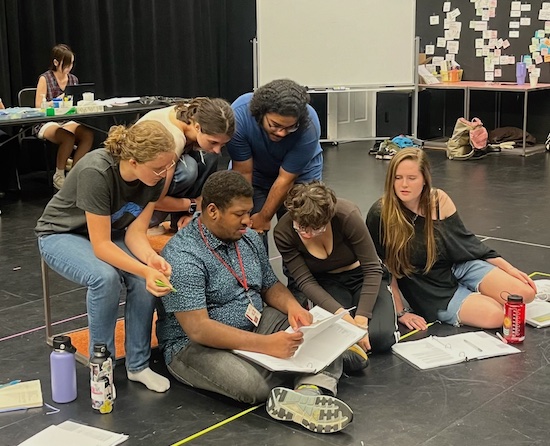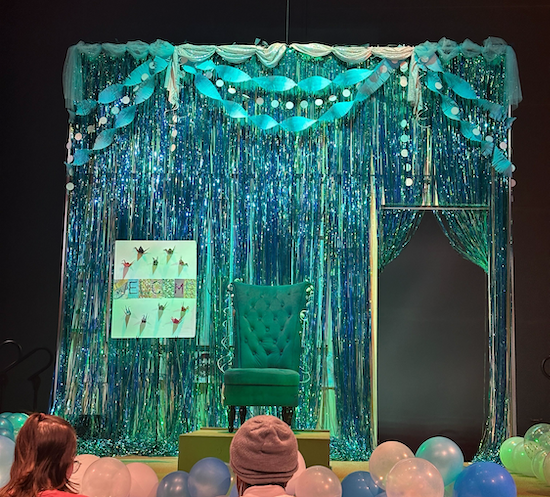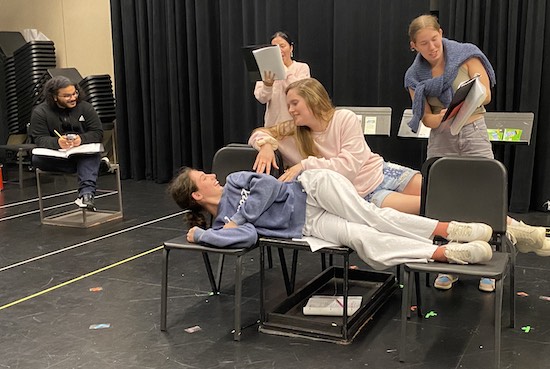
From Nov. 7 to Nov. 9, 2024, “Of Government” was performed in the Center for the Arts (CFA) Theater. The play—written by Los Angeles playwright Agnes Borinsky and directed by Assistant Professor of Theater Katie Pearl—explores the meaning of government for a small community in Montana. Through a convoluted yet endearing narrative, “Of Government” invites its audience to engage in examining the deeper purpose of society with its ensemble of eccentric figures.
From the moment I took my seat, I knew that “Of Government” was not your typical show. Entering the CFA, I was immediately greeted by the charming “Of Government” cast and crew, offering Swedish Fish and starting friendly conversations. In a party-like atmosphere, the audience was seated at onstage tables laden with crayons, origami papers, and the poem “When the World Goes Mad” by John Roedel. Additionally, the program for the show included campus resources for self-care and mental wellness in the wake of the 2024 presidential election.
“Of Government” starts with an interactive call-and-response song led by Ms. Marjorie Blaine (Lincoln Turner ’25), the play’s lively host. In this pre-show number, Blaine makes the turn-off-your-phone and fire-exit announcements a fun experience, immediately signaling how amusing the production will be. She ends the song with, “Who wants to see a play?” to which the audience responds with, “I want to see a play!”
Then begins a “The Little Mermaid”-style musical pageant in which Ariel (Lane Daniels ’28) is bidding farewell to her reef, despite the protests from her father, the Sea King (Elijah Philip ’28). During this underwater story, the characters wear flamboyant and sequined costumes that intentionally have a DIY look, underscoring the purposefully unpolished qualities of the production.
Once the musical number ends, the play shifts into a sequence of less fantastical scenes with interconnected elements. It’s important to note that the production involves numerous transitions that are performed deliberately in front of the audience, contributing to the show’s uniqueness and interactivity. During each transition, cast members hand out food, while Blaine leads sing-along songs, and one of them even features a special appearance from a dog, Maestro.
In an email to The Argus, Pearl explained how she intentionally chose to make these mechanical transitions into a playful experience for the audience, and how this approach represented a major theme of the play.
“The theme of the show is ‘lift them up’ and these transitions could be where we could feel that,” Pearl wrote. “Suddenly with actors and stage crew shouting encouragement to each other as they worked…the transitions became this celebratory, organized chaos that were feats of collaboration and wonderful to watch.”
The following scene takes place in a one-room Montana schoolhouse, where the audience is introduced to the loveable teacher Barb Lipke (Avi Kahtan ’28), and some of her quirky former students, including Heidi Schaffner (Lane Daniels ’28), who has been helping Barb out in the classroom, and Debbie Gamroth (Gabrielle Walker ’28), who recently returned to her home in hopes of figuring out her life. The audience learns that Debbie designed the costumes for the mermaid musical from the first scene, which Barb and Heidi attended. The audience also finds out that Barb’s school is closing down, much to the dismay of all the characters.

Interrupting Debbie and Barb’s reunion, Tawny Teeter (Cheyenne McLaskey ’26) makes a dramatic appearance as she begs her ex-teacher for money to support her through her pregnancy, since she doesn’t have proper healthcare. In her meltdown, Tawny explains how she plans to move to Canada to seek out better options, underscoring the failures of the U.S. medical system. Later that night, Barb is packing up her classroom when Tawny walks in with a gun, claiming to be the demon Chöd.
In this emotional scene, McLaskey portrays Tawny’s instability with such authenticity and nuance that the audience is left startled. When asked about their process of portraying such heavy material, McLaskey credited their personal background and empathetic approach.
“I come from a pretty rural, very working class background, so when deciding how I wanted to bring Tawny to the stage it really was a lot of remembering people I went to high school with or my family knew,” McLaskey wrote in a message to The Argus. “It’s just really important to [recognize] that people who make self-destructive decisions are always trying to fill a need…. I always made it a point to see anything my character did in the most compassionate way I could.”
The play then transitions to a hotel in Switzerland where Debbie is vacationing with her mother, Sharon (Hao Fu ’26), who is concerned about Debbie’s life plan. While bickering, they meet a seemingly proper Englishwoman Joan (Sophie Taubman ’25), who suddenly explodes in a lengthy and absurd monologue about a small town losing its grocery store. To the surprise of the audience, the scene gets even more outrageous when Heather Sharp (Olivia Harley ’26) arrives via helicopter to proclaim her love for Debbie, who she has been madly obsessed with since working on the mermaid production from the beginning of the play together.
In the final scene in “Of Government,” the audience is taken back to Montana where Heidi runs into a jogger, Sarah Parks (Ivy Lee ’28), while carrying political yard signs. It’s here that Heidi announces her intentions of running for town commissioner. Heidi—who has been presented as a bizarre character previously—gives a massive speech on all the ways she will make her town better as commissioner and how there is always room for improvement.
“The show ends with Heidi’s monologue about running for county commissioner, which we chose to have her pitch to the audience to help them understand the applicability of her ideas in our world,” Daniels wrote in a message to The Argus. “Heidi is not someone that society would argue is the ‘norm’ of a political candidate, but her platform and her as a person communicate this message: If you work hard and you care, you can make an impact [at] the local level [on] people’s lives.”
To conclude the play, the whole ensemble comes together for one final song to vocalize the core of the show. Singing to the audience, they ask, “What is a government?” and “What could be a government?”
As part of Wesleyan’s “Democracy 2024” initiative, “Of Government” works to promote civic and local engagement to its audience. Despite the play’s comical and outlandish presentation, “Of Government” has a deeper message that encourages its audience to organize, lift one another up, and make a difference. “Of Government” was also chosen with the 2024 presidential election in mind, creating a space for the audience to consider the role of democracy in society.

“Agnes Borinsky wrote ‘Of Government’ in response to the 2016 election,” Pearl wrote. “I chose to bring it to Wesleyan in 2024, knowing it would go up the weekend after this election, because I wanted a way for us to come together, whatever the outcomes, and feel ourselves as a community. As the week went on and the results came in, it became more and more clear how much the play was meeting the moment, in ways that allowed both the cast and our audiences solace, healing, and I think also some joy.”
In a message to The Argus, Turner—whose senior capstone project was their performance in the show—furthered Pearl’s point of the importance of political action and emphasized what they hoped attendees took away from seeing the show.
“I hope audience members leave knowing it’s okay to be afraid and feel grief for the future and past respectively but to know that we can and should continue to dream, create, and lift each other up as the final song indicates as I intend to do after I graduate!” Turner wrote.
For me, “Of Government” was more than just a show, it was an experience. From the moment I walked in, I was immersed in an unpredictable and dynamic environment that never ceased to astound me. Like the campus community itself, “Of Government” can best be characterized as weird and political, in the most positive sense.
Maggie Smith can be reached at mssmith@wesleyan.edu.


Leave a Reply